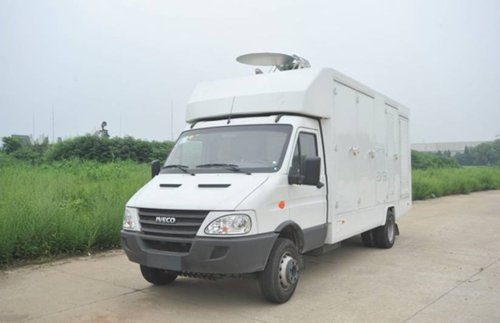


Pictured is a minivan with vehicle-mounted Microwave Active Denial System. Photo: Courtesy of Beijing Institute of Radio Measurement
China is developing a non-lethal weapon system based on microwave radar technology, which the chief engineer of the project said improves the country's counter-terrorist and land and maritime border defense capabilities.
Chief engineer of the project, surnamed Su, who is also a senior engineer from the Beijing Institute of Radio Measurement affiliated with the China Aerospace Science and Industry Corporation (CASIC), made the statement during an exclusive interview with the Global Times on Thursday.
Su said the project, officially named Microwave Active Denial System, works by shooting millimeter microwaves at targets, which can cause the pain nerve under the skin to ache in a bid to effectively halt the objective's violent actions and disperse targets.
The system has two working modes—a point launch mode designed for attacking definite targets in specific body parts, and a sector-sweep mode for bigger areas for missions, including expelling terrorist groups, Su said.
The non-lethal but highly effective system could be applied to situations including counter-terrorist operations, key targets protection during major events, maritime convoy missions, and border defense on land, Su said.
The potential customers of the product are the police and the country's Coast Guard.
Effectiveness and safety tests for the system have been conducted with professional departments, and results show that the system has excellent effectiveness and high security. It will not leave permanent injuries or cause long-term physical problems on targets while meeting its designed goals in dispelling enemies.
Compared to similar products in the world, the CASIC's Microwave Active Denial System is much smaller in size and lighter, according to Su.
The system does not come only in stationary form, but also a vehicle-mounted one which looks roughly the same as a minibus but with a radar antenna.
Overseas customers in countries and regions along the Belt and Road have shown great interest in the product, according to the expert.
 Fire brigade in Shanghai holds group wedding
Fire brigade in Shanghai holds group wedding Tourists enjoy ice sculptures in Datan Town, north China
Tourists enjoy ice sculptures in Datan Town, north China Sunset scenery of Dayan Pagoda in Xi'an
Sunset scenery of Dayan Pagoda in Xi'an Tourists have fun at scenic spot in Nanlong Town, NW China
Tourists have fun at scenic spot in Nanlong Town, NW China Harbin attracts tourists by making best use of ice in winter
Harbin attracts tourists by making best use of ice in winter In pics: FIS Alpine Ski Women's World Cup Slalom
In pics: FIS Alpine Ski Women's World Cup Slalom Black-necked cranes rest at reservoir in Lhunzhub County, Lhasa
Black-necked cranes rest at reservoir in Lhunzhub County, Lhasa China's FAST telescope will be available to foreign scientists in April
China's FAST telescope will be available to foreign scientists in April "She power" plays indispensable role in poverty alleviation
"She power" plays indispensable role in poverty alleviation Top 10 world news events of People's Daily in 2020
Top 10 world news events of People's Daily in 2020 Top 10 China news events of People's Daily in 2020
Top 10 China news events of People's Daily in 2020 Top 10 media buzzwords of 2020
Top 10 media buzzwords of 2020 Year-ender:10 major tourism stories of 2020
Year-ender:10 major tourism stories of 2020 No interference in Venezuelan issues
No interference in Venezuelan issues
 Biz prepares for trade spat
Biz prepares for trade spat
 Broadcasting Continent
Broadcasting Continent Australia wins Chinese CEOs as US loses
Australia wins Chinese CEOs as US loses